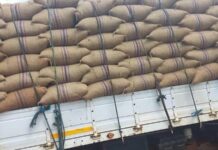The Council for Scientific and Industrial Research — Savanna Agricultural Research Institute (CSIR-SARI) has developed a technology to increase the yields of grain legumes, such as cowpea, Bambara bean groundnut, and soybean to ensure food security.
The new technology, known as microbial inoculant or bio-fertilizer, has been proven to increase the yield of soybeans to three tonnes per hectare, compared to the current yield, which stands at a maximum of one tonne per hectare.
The bio-fertilizer, which costs GHC35, a price 12 times cheaper than the inorganic fertilizer, costing about GHC500, has been used to cultivate a soybean demonstration farm at Botanga in the Kumbungu District of the Northern Region.
A group of leguminous crop farmers in various communities in the district visited the demonstration farm to assess how the soybean, inoculated with the bio-fertilizer, was doing.
Dr. Edwin Akley, the Research Scientist at CSIR-SARI, who explained the technology to the farmers, said while increasing yield it also improved farmers’ incomes, livelihoods, and nutritional status.
The new technology is being promoted under the Participatory Pathways to Sustainable Intensification: Innovation Platforms to Integrate Leguminous Crops and Inoculants into Small-Scale Agriculture and Local Value Chains (PASUSI) project in Ghana.
The project is being implemented by a consortium of institutions namely; CSIR – SARI, University of Helsinki, Finland, Norwegian University of Life Sciences, Norway, and Makerere University, Uganda with funding from the European Union.
It sought to improve the productivity, livelihoods, nutrition, and household well-being of farmers in northern Ghana while counteracting environmental degradation.
The project was being replicated in eight districts; Tolon, Kumbungu, Nanumba North, Zabzugu, Yendi, and Tamale Metro in the Northern Region, and East Mamprusi and Bunkpurugu-Nakpanduri in the North East Region. About 10,000 farmers are expected to be reached under the project.
“We are sure that when farmers use the new technology, there is going to be more nitrogen that will be fixed into the soil and the leaves of the crops will drop, and when the leaves drop, it is also going to improve soil fertility,” Dr. Akley said.
“So, when they rotate that field to the next crop, which could be millet, sorghum, or corn, what will happen is that in some cases, they do not have to apply the full mineral fertilizer that they need. They may apply for half. So, indirectly, the farmers will reduce their production cost by 50 percent if they adopt the new technology in their farming system.”
‘Another advantage of using microbial inoculant is that, unlike the mineral fertilizer that has issues with nitrate leaching into water bodies and contaminating the environment, in the microbial inoculant, there is a minimum of that”
The use of the new technology was also efficient in addressing issues of climate change amongst other environmental concerns.
Dr. Akley, therefore, encouraged farmers to use it as it performed similar roles to the mineral fertilizer, especially the urea, which was costly (GHc500).
Most of the farmers who visited the demonstration farm lauded the technology and gave the assurance that they would adopt it to improve productivity.
Ahmed Hafiz, maize, rice, and soybean farmer from Wuba Community, said the soybean had grown well, justifying the effectiveness of the technology.
Alhassan Gazale, maize, groundnut, and soybean farmer from Kpalsogu, said the seeds had grown well and they showed bigger grains, which was good for the farmers.









